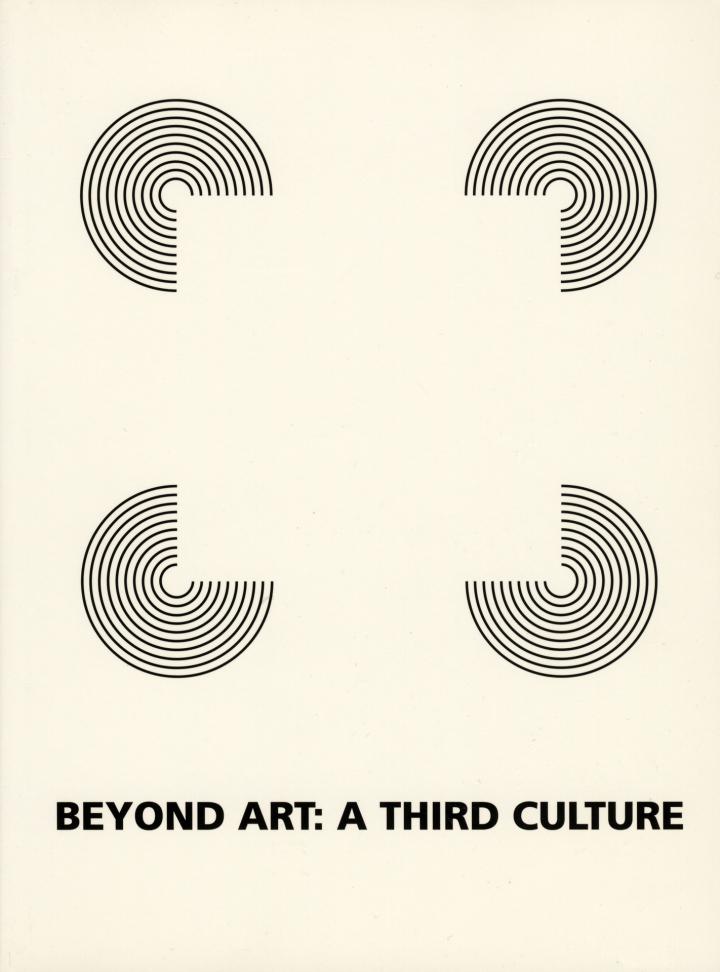Peter Weibel (ed.): Beyond Art: A Third Culture. A Comparative Study in Cultures, Art and Science in 20th Century Austria and Hungary (2005)
Filed under book | Tags: · art, art and science, art history, austria, computer art, conceptual art, cybernetics, history of science, hungary, mathematics, media art, philosophy, psychoanalysis, technology

“Austria and Hungary in the 20th century were nations that made enormous achievements in the formal sciences and arts: abstraction, logic, mathematics, physics, positivism, psychoanalysis, cybernetics, constructivism, economics, art, media art, and concept art. Art and science are usually divided into two different cultures, and nations, too, are seen as having separate ones. This book delivers a new model of consilience and convergence of art and science by closely studying in a material historical way by using a multitude of original papers and contributions, photographs, documents, bibliographies, biographies, and survey essays, the mutual influence of art and science in Austria and Hungary. In fields ranging from Gestalt psychology to Quantum physics, from constructivism to theories of vision, from holography to cyberspace, we discover a multitude of ideas, books, movements and personalities that have deeply influenced the world. Richly illustrated, the book is a nearly invaluable sourcebook, in which a new method, resembling more a CD-ROM narration than a dictionary, has been used to map an unknown horizon of knowledge. Those involved in the history of science or art and in the field of cultural theory, will find an incomparable frame of reference and information. They will discover not only genius, talents and themes they have not been aware of, but also a new model of culture, a third culture. The book is graphically and structurally user-friendly with a synopsis for each chapter, models, diagrams, images, corolaries and index etc.”
Publisher Springer, Vienna, 2005
ISBN 3211245626, 9783211245620
616 pages
PDF (40 MB, updated on 2019-10-30)
Comments (2)Robert Donald Romanyshyn: Technology as Symptom and Dream (1989)
Filed under book | Tags: · perspective, pornography, psychoanalysis, technology

“The development of linear perspective in the 15th century represented a radical transformation in the European’s sense of the world, the body and the self. Robert Romanyshyn’s book examines the claim that the development of linear perspective vision was and is indispensable to the emergence of our technological world. It does so by telling the story of how an artistic technique has become a cultural habit of mind.”
Publisher Routledge, 1989
ISBN 0415007879, 9780415007870
254 pages
PDF (17 MB, updated 2020-2-18)
Comments (3)Félix Guattari: The Three Ecologies (1989–) [FR, PT, DE, EN]
Filed under book | Tags: · body without organs, capitalism, deterritorialization, ecology, philosophy, psychoanalysis, schizophrenia, semiotics, transversality

Just as rare species are disappearing at an alarming rate, so whole areas of human thought, feeling and sensibility are becoming extinct through the power of an infantalizing mass media and the social exclusion of the old, the young and the unemployed. Extending the definition of ecology to encompass social relations and human subjectivity as well as environmental concerns, Guattari argues that the ecological crises that threaten our planet are the direct result of the expansion of a new form of capitalism and that a new ecosophical approach must be found which respects the differences between all living systems.
A powerful critique of capitalism and a manifesto for a new way of thinking, The Three Ecologies is also an ideal introduction to the work of one of Europe’s most radical thinkers. This edition of The Three Ecologies includes a chronology of Guattari’s life and work, introductions to both his general philosophy and to the work itself and extended notes to the original text.
French edition
Publisher Éditions Galilée, Paris, 1989
ISBN 2718603518
74 pages
English edition
Translation by Ian Pindar and Paul Sutton
Publisher Athlone Press, London, 2000
ISBN 0485004089, 9780485004083
174 pages
Google books (EN)
Les trois écologies (French, 1989, added on 2014-3-21)
As três ecologias (Portuguese, trans. Maria Cristina F. Bittencourt, 1990, updated on 2012-10-18)
Die drei Ökologien (German, trans. Alec A. Schaeret, 1994, added on 2016-4-27)
The Three Ecologies (English, trans. Ian Pindar and Paul Sutton, 2000, updated on 2012-10-18)

